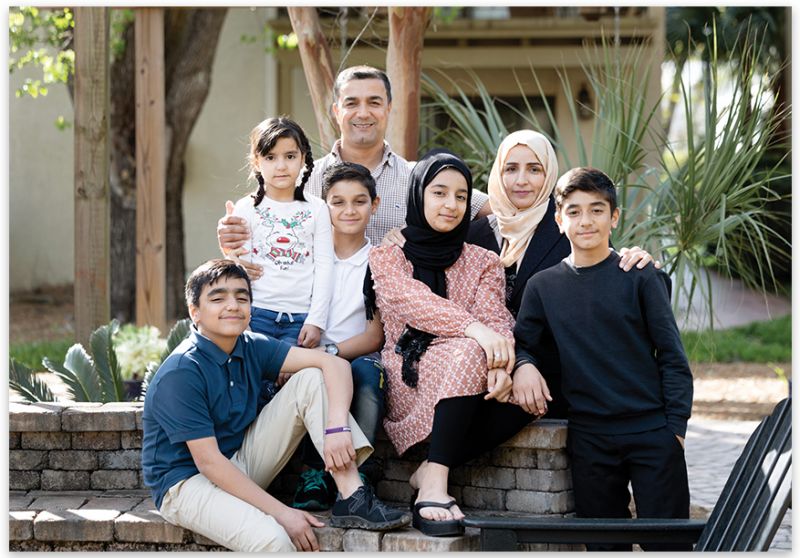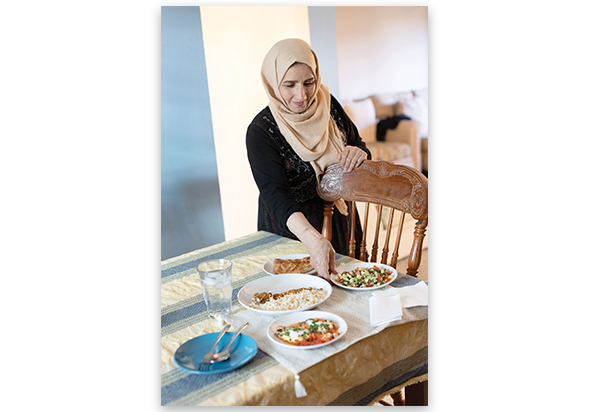Find out how you can help volunteer, provide transportation, offer employment, or donate

Asif Sediqi and his family arrived in Charleston last October after he worked in the American Embassy in Afghanistan for six years. Lutheran Services helped Sediqi get a job at a furniture store and find a new home for his family.
In August 2021, the United States evacuated its embassy in Kabul, Afghanistan, ending the longest war in American history. For Asif Sediqi, an Afghan security guard at the embassy for six years, the closure was a nightmare. The extremist Islamic group the Taliban, which sheltered terrorists from al-Qaeda to ISIS after 9/11, was set to recapture the country. Anyone who worked for the Americans was a target. “It was devastating,” Sediqi says through an interpreter. “Once the US troops left, it was a free-for-all. They [the Taliban] were looking for us. There was nowhere to go.”
Last October, after more than a year in hiding, Sediqi, his wife, and five children arrived in Charleston on a special visa. They are among the estimated 88,500 Afghans who have resettled in the US since President Joe Biden ended American military involvement in Afghanistan.
About 170 of those Afghan refugees now call Charleston home and another 150 are expected this year, according to estimates from the Lutheran Services Carolinas center in North Charleston, which opened in 2022. Their mission is to provide a safe landing for refugees, many of whom risked their lives and their families’ safety working with US and allied troops as guards, interpreters, or contractors. “I have clients who worked for the US military for 20 years,” says Seth Hershberger of Lutheran Services. “We owed them some sort of protection because they were there for us.”
In the Carolinas, Lutheran Services’ New Americans program helps newcomers from Afghanistan and other global hot spots with essentials such as housing, food, clothing, employment, and health care. “Many of the refugees can’t speak English and have large families,” says Zainab Amani, a caseworker whose family fled the Russian invasion of Afghanistan in 1983. “We help them with everything you can think of—bank accounts, job interviews. Some have never been to the dentist. Taxes? They don’t have taxes over there. It’s darn hard to start over in a new culture, a new language, a new environment. It’s a whole new life they have to learn.”
Lutheran Services has operated centers in Columbia and Raleigh, North Carolina, since the 1990s. But to absorb some of the influx of people from Afghanistan and, increasingly, Ukraine, the nonprofit opened offices in Charleston, Greenville, and Asheville last year. Others have opened recently or will soon. “In just a year and a half, we’re going from two sites to seven,” says Bekah Kinsella, Charleston’s resettlement director.

In addition to those fleeing Afghanistan, the Charleston office is assisting 40 refugees from Ukraine and 80 more are projected to arrive in the coming months. They bring a unique but similar set of challenges to their new home. “They are exhausted from the war,” says Irina Potapov, a case manager who immigrated to the US from Ukraine in 1996 “A lot of them came without their husbands. Many don’t speak the language and have other cultural and economic challenges. That’s where our organization comes in.”
Sediqi, 42, works for a furniture store, where he says he makes about $2,500 a month and pays $2,000 a month for rent in West Ashley. That income is augmented with $650 a month from the federal government, in addition to housing assistance and food stamps. Those benefits vary according to a family’s size and needs. In Sediqi’s case, they last eight months and will end this summer. “Although I appreciate all the help, I wish there was more of a long-term plan,” he says. “It’s a very scary thing to provide for a family of seven in a new country.”
Kinsella said the organization is working to help the recent arrivals get a toehold in their new city and then help them stand on their own. “The goal is what we call the ‘long welcome,’” she says. “Everything we do is to help them achieve self sufficiency.”
Despite the challenges, Sediqi said he is happy to be in the US—and Charleston in particular. He checked out the city online before he arrived and liked what he saw. “I knew that it was a desirable place to live. It’s beautiful. It’s clean. People are warm and friendly, and I can walk everywhere.”
But between working and raising five children, Sediqi has little time to enjoy the city. His youngest child begins kindergarten next year, a privilege she and her sister would not be allowed under the Taliban. “Their education is what I focus on. That’s what matters. That’s why we came here.
How to Help
For more information, visit lscarolinas.net/donate
■ Volunteers: Help newly arrived families, including language support and housing setup
■ Transportation: Provide rides to necessary appointments, including medical visits and public benefit offices
■ Donations: Walmart, Home Depot, or Visa gift cards, or rental vehicles to help move clients
■ Employment: Provide a job “We are always growing our network of employers,” Kinsella says. “Please get in touch if you have job opportunities.”